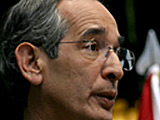Colom Exonerated but Not Vindicated
By Samuel Logan for ISN
Carlos Castesana, who led the international investigation into the 10 May 2009 murder of Guatemalan lawyer Rodrigo Rosenberg, delivered external pageunexpected findingscall_made to an astonished group assembled on 12 January in Guatemala City. Rosenberg, he said, organized his own murder to “open a Pandora’s box” as part of a conspiracy to discredit Guatemalan President Colom.
The news spread quickly, sparking a deluge of domestic and international press attention; enough media frenzy to overshadow Castesana’s second conclusion, one perhaps less unexpected but more important: Guatemala’s security system has collapsed.
With over 6,400 murders in the country in 2009, very few cases have been brought to court, Castesana told a local radio station, suggesting that as long as public security remains in tatters, the cold-blooded murders that convinced Rodrigo Rosenberg to organize his own death will continue.
According to the UN investigation, led by Guatemala’s International Commission Against Impunity (CICIG), Rosenberg was depressed, estranged from his children and emotionally involved with Marjorie Musa, who died along with her father - one of Rosenberg’s clients - coffee baron Khalil Musa, when gunmen on a motorcycle sprayed their car with bullets in April 2009.
Rosenberg’s own investigation into the murder of his lover and her father offered little proof. Frustrated with the investigation, encumbered by guilt and depressed, the lawyer decided to organize his own death.
According to the UN investigation’s conclusion, Rosenberg purchased two cell phones, using one to communicate with his would-be assassins and the other to orchestrate his own death threats. Days before he died, he is said to have asked a friend to repair his bicycle, which he planned on riding down a well-heeled street in Guatemala City when the hired hit men were scheduled to drive up and kill him. They did so with three bullets to the head, one to the chest and one in the back. He had paid them $35,000 for the trouble.
Before he died, Rosenberg prepared a post-mortem video in which he blamed Colom and two high-ranking government officials for his death, hoping that the video would spark a movement to remove the president from office.
''Unfortunately, if you are watching the message, it is because I was assassinated by President Alvaro Colom,” Rosenberg said in the video, which spread across online media, crashing servers on 11 May, when friends released the video just after Rosenberg’s funeral.
The video’s release catalyzed the most significant news event in Guatemala in 2009, placing considerable pressure on Colom, who did not capitulate.
"The day has arrived that I have waited for in silence and patience, where this crime has finally been clarified," Colom told reporters on 12 January, after receiving the news.
The investigation culled information gathered by 300 investigators flown in from 11 countries. They studied phone records, surveillance tapes and prepared at least 135 interviews, in an exemplary effort that reminded Guatemalans of why the CICIG is Guatemala’s most stalwart judicial tool.
Information gleaned from Rosenberg’s investigation, however, also corroborated Castesana’s conclusion that Guatemala’s security system is broken.
The UN investigation exonerated Colom of corruption and quelled any opposition movement to discredit the president. Yet the CIGIC soundly draped on Colom’s shoulders responsibility for the insecure environment that facilitated the late lawyer’s death and that of his girlfriend and her father.
At the end of his administration, Colom may look back to see that he dodged a bullet, but Guatemalans will likely not remember him as the president who did not kill Rosenberg, one Guatemalan, rather as the president who did little to stop the death of thousands of Guatemalans.

